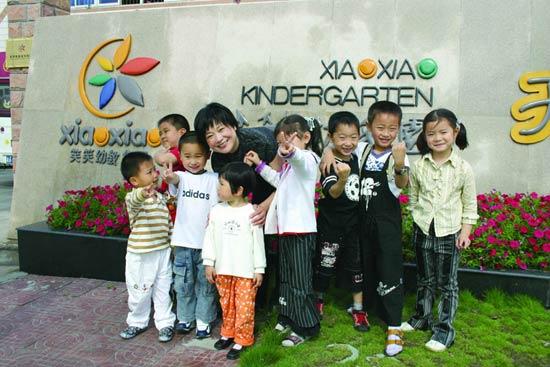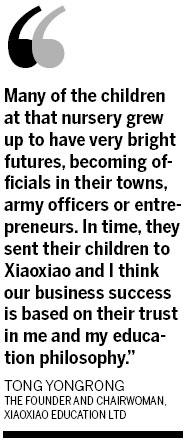
Tong Yongrong and children pose for a picture at her Xiaoxiao Kindergarten in Hangzhou, the capital of East China's Zhejiang province. [Photo / Provided to China Daily]
BEIJING - Appropriately, Tong Yongrong's family name means "children" in Chinese. The founder and chairwoman of Xiaoxiao Education Ltd says she is destined to devote her whole life to loving children, and not just her own.
Tong, whose company is an Australia-listed pre-school education provider based in Hangzhou, in East China's Zhejiang province, said: "I have been working in children's education for more than 30 years and I believe smiling and love form the core of the industry as well as providing the best logo for our company."
The businesswoman established her first Xiaoxiao kindergarten in 1996. Her company now operates 10 kindergartens and an art training school in China and is preparing to open another 10 kindergartens. It was listed on the Australian Stock Exchange (ASE) in 2010, raising about A$7 million ($6.6 million).
Tong says she takes advantage of her femininity and motherhood in winning in business. "Children at my kindergartens always call me mother Tong or grandmother Tong and I regard the parents and my employees as brothers and sisters. It is the proudest thing in my life," she said in her characteristically mellow and sweet voice.
Born in 1963 to a well-educated family in Hangzhou, Tong moved to a small village nearby with her parents when she was 9 during the "cultural revolution" (1966-76).
"I'm quite talented in taking care of children and always led children in the neighborhood in reading and writing or playing games together when I was young," she said.
After graduating from middle school, Tong started her career in children's education as a teacher in a tatty rural nursery when she was 19, a simple girl with a straight bang and two pretty braids.
She said: "We didn't have any curriculums or instructional theory and children of different ages were mixed together in the same class."
However, Tong had already developed her own concepts for educating children.
She frequently took the children to watch cars and trains in a town about an hour's walk away. "In isolated rural areas, the priority in teaching was to enable children to observe the new things and phenomena of modern society as soon as possible so they didn't lag behind their peers in the cities," she said.
In the absence of textbooks, Tong gave her children language classes by taking advantage of local resources. They moved the classroom to vegetable fields and fisheries or farms so the children could learn new vocabulary by touching real plants and animals as well as making up stories using the new words they had just acquired.
"The rural nursery was a cradle in which my interests in children's education and also my initial pre-school education theory was cultivated," Tong said.
"Many of the children at that nursery grew up to have very bright futures, becoming officials in their towns, army officers or entrepreneurs. In time, they sent their children to Xiaoxiao and I think our business success is based on their trust in me and my education philosophy."
Do-or-die

After three years at the rural nursery, Tong was promoted to work at a kindergarten affiliated to a factory in Hangzhou.
On the first day, the classroom was a riot of screams and tears. In the 1980s in particular, pre-school education in China was rigid and children had to sit up straight with their hands behind their backs during lessons. They couldn't talk unless they raised their hand and sought the permission of their teacher.
Tong began to encounter conflicts between her education ideas and reality.
"At that time, kindergarten teachers believed that good education enabled children to become very obedient," she said. "Parents judged their children's education to be good or bad on the basis of how many characters or ancient poems they learned."
Tong found it tough fighting against the traditional notions of children's education so she quit her job and started her own business in real estate.
Several years later, in 1996, Tong returned to her first career, having made enough money to enable her to establish the first Xiaoxiao kindergarten on a barren former vegetable field in Xiaoshan Development Zone in Hangzhou.
"At the beginning we only had 28 employees and 28 children and money was a big problem," Tong said. "I was upset at seeing the empty playground, swimming pool and dance room."
But ever optimistic and strong willed, Tong sold all her jewelry, used up all her savings and moved into the kindergarten with her son, betraying a do-or-die determination to her employees and others.
During the Chinese New Year in 1997, Tong only had 200 yuan ($30) to her name and was sad because she had nothing to put in the red packages for parents.
"I believe in the sunshine that comes after strong wind and heavy rain," Tong said. "Smiling and sincerity was the best strategy to win the hearts of parents and their children."
Tong asked all teachers to sit themselves down with a smile when they were talking to children. She also set detailed standards for activities such as cleaning the floor, washing tableware and sterilizing towels. She also advocated getting children out into wider society. Xiaoxiao includes activities such as asking children to sensibly spend 100 yuan at the supermarket, department store or open fair.
She found two or three children might chip in for one essential item while others would try to bargain with the salesperson.
"It seems such a simple activity but children not only learn mathematics but also team spirit and the skills of communication," Tong said.
Children at Xiaoxiao also have the opportunity to experience life with people such as pregnant women, firefighters, policemen and doctors. They learn to master the basic skills of survival and how to love people.
Tong attributes the success of Xiaoxiao to such practical education, which helps to create more polite, confident and sociable children.
"These advantages are the proudest things for the parents of the new generation," she said. "Any teacher can teach children the poems of the Tang Dynasty or arithmetic. However, changing behavior is more difficult."
Six months after opening her first kindergarten, Tong happily noticed more and more children were holding the hands of their parents when they arrived for registration.
Tong also remembered that when the first batch of children graduated from the kindergarten, they firmly hugged their teachers and cried. "Everything seemed worth it at that moment," she said.
Development
After its initial public offering, the company planned to spend A$3 million on new kindergartens in China and Australia. Another AU$100,000 will go towards research and development of curriculums, teacher training and other practical activities.
A Xiaoxiao kindergarten was also opened in Sydney. Tong said that the company will "walk on two legs" with expansion in both China and overseas.
She added: "It is a good business model because the education resources can be shared in both countries. We will develop at a smooth pace because education is not an industry that can be rushed."
According to the Ministry of Education, there were 133,700 kindergartens in China in 2008, 4,636 more than in 2007. The proportion of private kindergartens rose to 62.2 percent of the total in 2008 and is expected to keep rising in the future.
"We feel pressure from State-run kindergartens because most teachers still prefer the titles and also relatively higher salary they offer," Tong said, adding that's why kindergartens with a good reputation in China tend to be crowded while others have difficulties in wooing pupils.
The Chinese government has embarked upon a process of balancing the relationship between private and State-owned kindergartens and encouraging first-rate teachers to work in the private sector.
Tong said: "Private kindergartens should concentrate on improving the quality of the education they offer. Competition will be mainly based on which is able to be more creative within the government-set curriculum."
When the post-80s generation become parents, Tong said they are very open to creative concepts and have more knowledge about children's education compared with their parents' generation.
"They are always questioning you and at the same time raising very constructive issues," she added.
Tong also said that she couldn't wait for the coming of the post-90s generation of parents because she expects to learn new ideas from this arguably more adventurous sector of society.
"I have started using Weibo and playing computer games in an attempt to learn about their way of thinking and understand their demands," she added.





